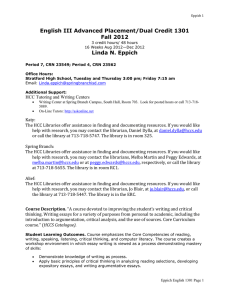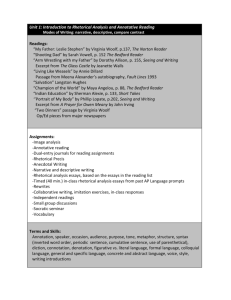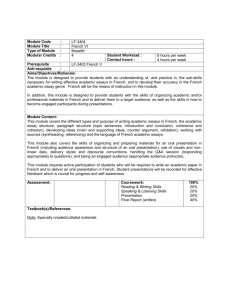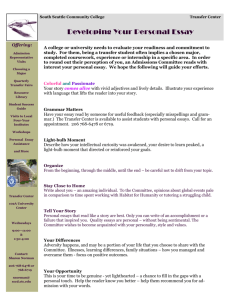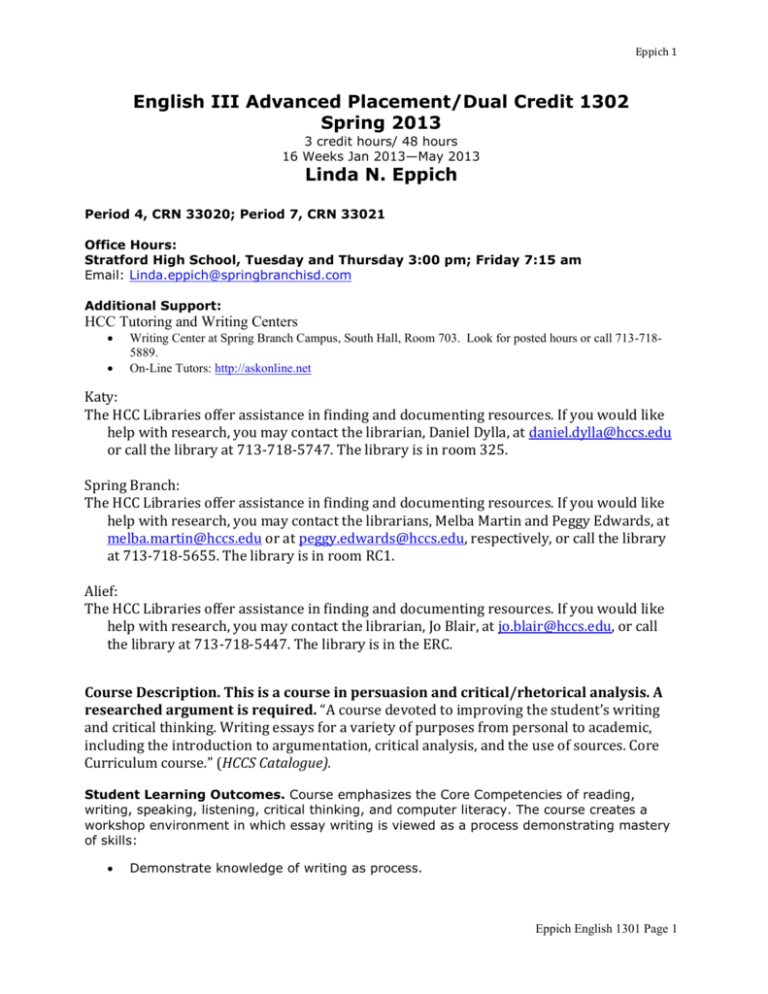
Eppich 1
English III Advanced Placement/Dual Credit 1302
Spring 2013
3 credit hours/ 48 hours
16 Weeks Jan 2013—May 2013
Linda N. Eppich
Period 4, CRN 33020; Period 7, CRN 33021
Office Hours:
Stratford High School, Tuesday and Thursday 3:00 pm; Friday 7:15 am
Email: Linda.eppich@springbranchisd.com
Additional Support:
HCC Tutoring and Writing Centers
Writing Center at Spring Branch Campus, South Hall, Room 703. Look for posted hours or call 713-7185889.
On-Line Tutors: http://askonline.net
Katy:
The HCC Libraries offer assistance in finding and documenting resources. If you would like
help with research, you may contact the librarian, Daniel Dylla, at daniel.dylla@hccs.edu
or call the library at 713-718-5747. The library is in room 325.
Spring Branch:
The HCC Libraries offer assistance in finding and documenting resources. If you would like
help with research, you may contact the librarians, Melba Martin and Peggy Edwards, at
melba.martin@hccs.edu or at peggy.edwards@hccs.edu, respectively, or call the library
at 713-718-5655. The library is in room RC1.
Alief:
The HCC Libraries offer assistance in finding and documenting resources. If you would like
help with research, you may contact the librarian, Jo Blair, at jo.blair@hccs.edu, or call
the library at 713-718-5447. The library is in the ERC.
Course Description. This is a course in persuasion and critical/rhetorical analysis. A
researched argument is required. “A course devoted to improving the student’s writing
and critical thinking. Writing essays for a variety of purposes from personal to academic,
including the introduction to argumentation, critical analysis, and the use of sources. Core
Curriculum course.” (HCCS Catalogue).
Student Learning Outcomes. Course emphasizes the Core Competencies of reading,
writing, speaking, listening, critical thinking, and computer literacy. The course creates a
workshop environment in which essay writing is viewed as a process demonstrating mastery
of skills:
Demonstrate knowledge of writing as process.
Eppich English 1301 Page 1
Eppich 2
Apply basic principles of critical thinking in analyzing reading selections, developing
expository essays, and writing argumentative essays.
Analyze elements such as purpose, audience, tone, style, strategy in essays and/or
literature by professional writers.
Synthesize concepts from and use references to assigned readings in their own
academic writing.
Write essays in appropriate academic writing style using varied rhetorical strategies.
Clear thesis statements
Relevant, engaging evidence, comprising developed reasoning using
modes of discourse with elaboration of detail and example
Focused and purposeful organization based on a unifying principle
Appropriate strategies to purposefully engage a targeted audience
Purposefully constructed and varied syntax
Skillful choice of diction and style
Persuasive grammar
Appropriate tone
Correct use of manuscript form (MLA)
Learning Objectives. Course emphasizes the Core Competencies of reading, writing,
speaking, listening, critical thinking, and computer literacy. The course creates a workshop
environment in which essay writing is viewed as a process demonstrating mastery of skills:
Demonstrate writing as a connected and interactive process which includes planning,
shaping, drafting, revising, editing, and proofreading.
Demonstrate critical abilities when discussing texts in class and in writing
assignments by delving into the meanings and implications behind the issues, theses,
or themes.
Analyze texts by professional writers and write critical essays breaking down
rhetorical elements into parts, examining the parts, and showing their effect.
Apply various methods of development and organization, and / or rhetorical appeals
in written assignments.
Demonstrate effective use and documentation of sources in support of student ideas
in informative and/or persuasive essays.
Educational Outcome. Students will compose a minimum of 6000 words during the
semester as they
Understand writing as a connected, interactive process that includes planning,
shaping, drafting, revising, and editing.
Apply the writing process as appropriate to in-class, impromptu writing
Apply the writing process to revise impromptu writing for a wide variety of purposes
Apply peer and teacher comments from evaluated essays to other writing projects
Use principles of critical thinking in analyzing reading selections and in developing
expository and argumentative essays
Use assigned readings as mentor texts in developing essays
Analyze rhetorical elements, such as purpose, audiences, tone, strategies, in both
professional writing and student exemplars
Use a variety of modes of discourse and writing strategies to develop writings
Use thoughtful, careful reasoning and logic in all writing assignments
See English 1301 Study Guide.
Prerequisites. A satisfactory TAKS or COMPASS score; credit for English 1301.
Eppich English 1301 Page 2
Eppich 3
Reasonable Accommodations. Any student with a documented disability who needs to
arrange reasonable accommodations must contact the Disability Services Office for
Northwest College at the beginning of the semester at the ADA Counseling office in RC 12 at
the Town and Country campus: 713.718.5422. Faculty members are authorized to provide
only the accommodations requested by the Disability Support Service Office.
Academic Honesty. All work you submit must be your own. Services of Turnitin.com will be
employed. If you consult any sources, whether oral or written, you must clearly distinguish
between your words/ideas those of a source at all times:
Students are responsible for conducting themselves with honor and integrity
in fulfilling course requirements. Penalties and/or disciplinary proceedings
may be initiated by College System officials against a student accused of
scholastic dishonesty. Scholastic dishonesty includes, but is not limited to,
cheating on a test, plagiarism, and collusion.” (HCCS Student Handbook)
Cheating includes, but is not limited to,
Copying from another student’s paper
Using materials not authorized by the person giving the test
Collaborating with another student during a test without authority
Knowingly using, buying, selling, stealing, transporting, or soliciting in whole
or in part the contents of an un-administered test
Bribing another person to obtain a test that is to be administered
“Plagiarism means the appropriation of another’s words or ideas and the unacknowledged
incorporation of that work in one’s own written work offered for credit.” (HCCS Student
Handbook)
“Collusion means the unauthorized collaboration with another person in preparing written
work offered for credit.” (HCCS Student Handbook)
Work which shows any evidence of plagiarism and/or collusion will receive a grade of zero. A
grade of “F” may be given for the entire course.
Attendance and Withdrawal Policies. Students with more than 6 hours of absences or 3
classes may be dropped for excessive absence. Only the instructor has the ability to drop a
student from a course. In 2007, the Texas Legislature passed a law limiting students to no
more than six total course withdrawals throughout their academic career in obtaining a
baccalaureate degree. There may be future penalties imposed.
Course Requirements for HCCS Grade. In-class midterms and final exam essays must
average above 70% to receive a grade of A-D, i.e., credit for the course. A minimum of 5000
words is required.
Readings: This is a discussion-based course. Reading quizzes/journal
entries/professionalism/presentations (enthusiastic participation in all facets of
classroom life). Portfolio Assessment/Participation: 10% (reading quizzes count
more heavily for SHS grades!)
Essays: 60%
McGraw-Hill Personalized Learning Plan: 10%
Final Exam Essays: 20%
Eppich English 1301 Page 3
Eppich 4
In-class midterms and final-exam essays must average above 70% to receive a
grade of A-D, i.e., credit for the course. A minimum of 5000 words is required.
Course Requirements for Stratford Grade. Many SHS grades do not become a part
of the HCCS grade.
Weight 1: daily/quizzes/homework/journals/in-class exercises/group
work/presentations
Weight 2: major quizzes/homework
Weight 3-5: Major tests and essays
A (90-100) Exceptionally fine work, with superior mechanics, style, and content.
B (80-89) Very good work. More than meets requirements.
C (70-79) Good work that achieves its purpose. Fully meets all requirements.
D (60-69) Below-average work. Noticeably weak.
F (0-68) Failing work that is clearly deficient.
Late Work/Make-Up Work. This is a process class—not a “turn-it-in-for-a-grade
class.” The instructional process fails when you fail to read assigned texts or to
submit homework in an orderly manner. Homework and journal entries cannot be
submitted late (Weights 1 or 2). Major essays (Weight of 3 for SHS only) will be accepted
late for a 10% penalty per calendar day. Quizzes and tests should be made up within 7
calendar days of the original test date; at the teacher’s discretion a make-up test or quiz can
be required during the first day back of the student’s return; seven days is the maximum
number of days to make-up in-class essays or quizzes. If you are absent, your homework is
due the morning of the next calendar day—not the next day you have class on alternating
block. If you are absent, you must pick up missed handouts the next calendar day—not the
next class day on alternating block.
EGLS3 -- Evaluation for Greater Learning Student Survey System at Houston Community
College. Professors believe that thoughtful student feedback is necessary to improve
teaching and learning. During a designated time, you will be asked to answer a short online
survey of research-based questions related to instruction. The anonymous results of the
survey will be made available to your professors and division chairs for continual
improvement of instruction.
TEXTBOOKS AND STUDENT RESOURCES
Analysis Worksheets and Primary Documents: Artifacts, Cartoons, Documents, Maps, Motion
Pictures, Paintings, Photographs, Posters, Sound Recordings. U.S. National Archives
& Records Administration www.archives.gov.
Barnet, Sylvan, William Burto, and William E. Cain, eds. Literature for Composition. 8th ed.
Upper Saddle River: Pearson Longman, 2003. REQUIRED in class every day.
CNN: Current Event Awareness. Video database.
http://www.pbs.org/now/thisweek/archive.html.
Daniel, Kathleen, et al. Elements of Literature. Fifth Course. Austin: Holt, 2000. [EOL]
Eppich English 1301 Page 4
Eppich 5
Fitzgerald, F. Scott. The Great Gatsby. What is our responsibility to preserve the physical
environment for the American Dream? Close reading of argument through dominant
image; analysis of relationship of narrator to text; ethos of narrator (text is
provided).
HCC Northwest College English 1302 Study Guide. Available at the campus bookstore.
REQUIRED in class every day.
McGraw-Hill Personalized Learning Plan for Grammar (student purchase)
HCC students are required to register for their section’s McGraw Hill Grammar Book and Program ($30
online payment required; http://connect.mcgraw-hill.com/class/l_eppich_23549; http://connect.mcgrawhill.com/class/l_eppich_23562.
Twain, Mark. The Adventures of Huckleberry Finn. Close reading of a rhetorical novel. (text
is provided).
SUPPLEMENTAL RESOURCES
Excerpts from nonfiction from College Board Released AP Practice Tests and Prompts.
Kirszner, Laurie G., Stephen R. Mandell, and Patrick Clauss. Patterns in College Writing. 10th
ed. Boston: Bedford/St. Martin’s, 2006.
McQuade, Donald, and Robert Atwan, eds. The Writer’s Presence: A Pool of Readings. 5th ed.
Boston: Bedford/St. Martin’s, 2006.
Shea, Renee H., Lawrence Scanlon, and Robin Dissin Aufses. i-Claim. DVD. The Language of
Composition: Reading, Writing, Rhetoric. Boston: Bedford/St. Martin’s, 2008.
REQUIRED SUPPLIES
McGraw-Hill’s Personalized Learning Plan—online grammar handbook
Loose-leaf binder dedicated to English with dividers, wide-lined loose-leaf paper, and
three-holed blank computer paper
Blue-ink pen; pencils; highlighters; post-it notes
Writing Portfolio
Two narrow-ruled Composition Books
PROJECTED CALENDAR
SUBJECT TO CHANGE!!!!
UP-TO-DATE CALENDAR POSTED AT
HTTP://SSSH.SPRINGBRANCHISD.COM/FACULTY/TEACHERS/LANGUAGEARTS/LINDAEPP
ICH/TABID.17541/DEFAULT.ASPX
How do we build self-empowerment? Is the achievement of the American Dream
still possible? How is the use of language connected to the Dream? Understand the
elements of the rhetorical situation of arguments, appeals, assumptions, rhetorical
triangle; use SOAPStone as a strategy to analyze elements; apply the modes of
discourse in journal writing; establish a Personalized Learning Plan for grammar; apply
Eppich English 1301 Page 5
Eppich 6
organizational patterns that support purpose; improve precision of word choice; use MLA
formatting; revising (peer evaluation) and editing; using turnitin.com as a “grammar
checker.”
o
o
o
o
o
o
o
o
o
o
o
o
o
o
o
o
o
o
o
Jan 8—11 (alternating block schedule)
Ch. 1 in Language for Composition
English 1302 Study Guide: Critical Analysis 22-35
Mary Elizabeth Dodge (1862). “I am a Woman.” AP Excerpt.
Thomas Da Quincy. “The Poetry of Pope.” Literature of Knowledge and Literature of
Power. 1848. AP Excerpt.
Introduction into rhetorical novel: The Adventures of Huck Finn.
Jan 14--30
Ch. 2 in Language for Composition
Ralph Ellison. “On Bird, Bird-Watching, and Jazz,” Shadow and Act. (1953). Exerpt.
Geoffry Nunberg.”The Decline of Grammar.” Atlantic Monthly. (1983).
http://www.pbs.org/speak/speech/correct/decline/.
Analysis of Twain’s arguments.
Group Impromptu Research project: Connecting historical/current events to
universal issues in fiction using editorials, graphs, and informative text.
Due: 25: McGraw-Hill PLP Initial Diagnostic Due
Jan 18—28
Analysis of Twain’s arguments and synthesis presentations of research on universal
issues.
Levels of Language in Huck Finn.
Fredrick Douglass. Narrative. In-class analysis.
“Word Origins.” Excerpt.
“Teacher Salaries.” (1996). Excerpt.
“Paul Erdos—Mathematics.” Excerpt.
Mary Wollstonecraft. Chapter 2. The Rights of Women.
Due: Rhetorical Essay. Online hours: Rhetorical analysis of blog—“Huck, Jim, and
Cosmology.” Attach a hard copy of the blog to your essay. Annotate the blog before
you compose your analysis: mark the sections, find the big rocks (strategies), and
label SOAP in the top margin.
http://astronomy.blogs.deseretnews.com/2009/02/03/huck-jim-and-cosmology/
o
Jan 31—Feb 5
Due: Grammar as Rhetoric and Style. Parallel Structure. LOC 339. Subordination.
LOC 999.
“Word Origins.” Mill on Bentham.
Contrast Wm E. Burghardt DuBois. “The White World.” An Essay toward an
Autobiography of a Race Concept. (1940). Walter Isaacson. Benjamin Franklin: An
American Life. 2004.
James Baldwin. “If Black English Isn’t a Language, Then Tell Me, What Is?”
http://www.nytimes.com/books/98/03/29/specials/baldwin-english.html In-class:
Argumentative essay on language and the American Dream: James Baldwin. Bring a
hard copy of the essay!!!
Introduction to The Great Gatsby as a rhetorical novel.
o
o
Feb 6--Feb 15
Assignments Gatsby
In-class MIDTERM essay.
o
o
o
o
Eppich English 1301 Page 6
Eppich 7
Using Sources to Argue Understand purpose in research assignments (informative,
interpretive, persuasive); use databases and casebooks to search for online and print
sources; integrate information from graphics; distinguish between primary and
secondary sources; integrating quotes; in-text citation; synthesize sources; use MLAformatting to create a Works Cited page; avoid plagiarism; share findings on social
networks
o
o
o
o
o
o
Feb 16—Feb 22
English 1302 Study Guide: Persuasion 5-21.
APMC Rhetorical Practice Test
Due: Feb 18/19—Casebook Annotated Bibliography of 7 sources on a Controversial
Issue. Select a topic in Language for Composition, and prepare a typed, MLA-styled
annotated bibliography of 5 essays, one graphic, and one photograph. If you are
absent, email Ms. Eppich your essay BEFORE the first minute of your class period
and bring a hard copy for her to grade the next SCHOOL day. Otherwise, the late
penalty applies. If your computer breaks or will not print, the late penalty applies. If
the email fails to arrive, the late penalty applies. Post reflection on Eduphoria—200
words. This will be shared in class.
Due: Handwritten rough draft of controversial issue paper—800 words. Introduction
to fallacies
Feb 23-Mar 7
Due: Mar 4. 60% of McGraw-Hill.
Due: Mar 4/5. Researched argument on controversial issue attached to handwritten
rough draft with inked-in additions, first typed draft with ink-ed in revisions, final
draft of 1000 words (max). If you are absent, email Ms. Eppich your essay BEFORE
the first minute of your class period and bring a hard copy for her to grade the next
SCHOOL day. Otherwise, the late penalty applies. If your computer breaks or will not
print, the late penalty applies. If the email fails to arrive, the late penalty applies.
Relationships between Certainty and Doubt. Evaluating logic versus emotion.
Understand dominant impression as pathos appeal; identifying fallacies in logos appeals;
evaluating ethos appeals; using analogies, similes, and metaphors as comparative devices.
Mar 8; Mar 18-28
Due: Mar 18th. 80% of McGraw-Hill.
Introduction to fallacies. Christian Brahmstead. “Feeding the Squirrels.” Washington
Post.
Excerpt-Patrick Henry “Speech to the Virginia Convention.” EOL 101.
Excerpt-Thomas Paine’s “The Crisis, No. 1.” EOL 107.
Video Excerpts-Speeches: President Obama, George Bush’s 9-11, Ronald Regan’s “Tear
Down This Wall,” and FDR’s “Four Freedoms.”
Review of argument structure: classical and rogerian.
MIDTERM argument.
“Magna Shoes.” The Onion
“Coke Letters.”
George Will. “Being Green at Ben and Jerry’s.”
Apr 1--16
Due: Apr 5th. Completion of McGraw-Hill PLP.
Due: Apr 12th. PLP Post Diagnostic McGraw-Hill.
Eppich English 1301 Page 7
Eppich 8
MIDTERM rhetorical analysis.
MIDTERM synthesis.
Due: April 15/16. Typed, MLA-styled rhetorical analysis of speech.
Selections of editorials and speeches used on released AP prompts: Certainty and Doubt
FINAL EXAM
April 31 and May 2 for A-day. Make-ups must be done ahead this time!!
May 1 and May 3 for B-day. Make-ups must be done ahead this time!!
Eppich English 1301 Page 8

